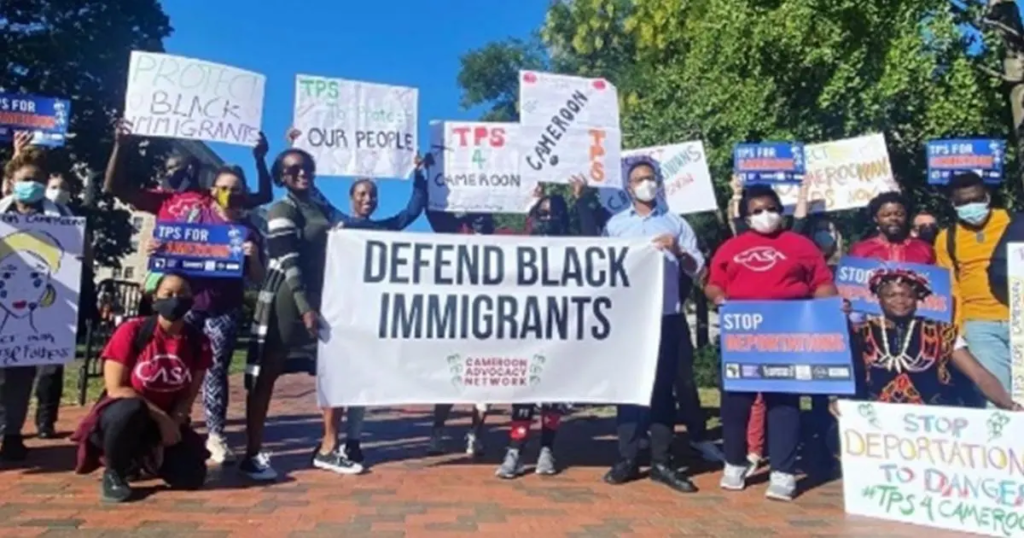A recent U.S. federal court ruling has put the lives of more than 7,000 Cameroonians at risk of deportation. The court has backed a Trump-era move to end Temporary Protected Status (TPS) for Cameroon, a humanitarian immigration program that has shielded thousands of Cameroonian nationals from being forced to return to a country still dealing with conflict and instability.
This legal decision marks a significant shift in immigration policy and could trigger major consequences for thousands of African families who have built their lives in the United States over the past several years.
What Is Temporary Protected Status (TPS)?
Temporary Protected Status, or TPS, is a humanitarian program created by the U.S. government in 1990. It provides temporary legal status to foreign nationals from countries facing ongoing armed conflict, natural disasters, or extraordinary conditions that make it unsafe to return.
Under TPS, immigrants can live and work legally in the U.S. but are not given permanent residency or citizenship. Once the status ends, beneficiaries are expected to return to their home country unless they qualify for another form of immigration relief.

Why Was TPS Granted to Cameroonians?
The U.S. first granted TPS to Cameroonian nationals in 2022 due to violence and unrest in several regions of Cameroon. The Central African country has faced political instability, armed conflict between government forces and separatist groups, and widespread human rights violations.
TPS allowed Cameroonians who were already in the U.S. as of June 2022 to stay legally for 18 months, with extensions granted due to ongoing instability in their homeland. The program also enabled them to obtain work permits and protect their families from deportation.
The Court Ruling That Changed Everything
In July 2025, a U.S. federal appeals court ruled in favor of reinstating the Trump administration’s decision to terminate TPS for Cameroon. The court stated that the executive branch has broad authority to determine when and how TPS designations should be ended.
This decision overturns earlier efforts by immigrant advocacy groups and legal teams to block the termination. It now opens the door for deportation proceedings to begin against thousands of Cameroonians currently under TPS protection.
Who Is Affected?
The decision affects more than 7,000 Cameroonians living across the United States, including students, healthcare workers, business owners, and families with U.S.-born children. Many of these individuals have lived in the U.S. for years, built careers, and integrated into American communities.
The news has sparked fear and anxiety among Cameroonian communities, especially in states like Texas, Maryland, and California, where many TPS holders live and work.
Human Rights Groups Raise Concerns
Several human rights organizations have condemned the court’s decision, calling it a step backward for humanitarian protections.
Groups like the Center for American Progress and African Communities Together argue that Cameroon remains unsafe. They warn that deporting TPS holders could lead to serious threats to life and liberty, especially for those who fled political persecution or conflict zones.
Reports from international watchdogs continue to document abuses by security forces, violent clashes, and civilian displacement in the Anglophone regions of Cameroon.
Cameroonian Government’s Response

As of now, the Cameroonian government has not issued an official statement about receiving thousands of deportees. However, previous deportations to Cameroon have sparked international criticism, with concerns over how returnees are treated upon arrival.
There have been past cases where Cameroonian deportees faced detention, torture, and surveillance once they were sent back—especially those who were politically active or fled from opposition-held areas.
What Happens Next for TPS Holders?
Now that the court has supported the decision to end TPS, affected Cameroonians could begin receiving notices to appear in immigration court for removal proceedings.
However, immigration lawyers advise TPS holders not to panic. There may still be other legal options, such as:
- Asylum applications
- Family-based petitions
- Employment-based green cards
- Special humanitarian relief
Each case is different, and legal experts are encouraging Cameroonians to consult immigration attorneys immediately to explore alternatives to deportation.
Political Impact and 2024 Election Echoes
This development reflects a broader immigration debate that continues to shape American politics. Former President Donald Trump has long pushed for stricter immigration policies, including the end of programs like TPS and Deferred Action for Childhood Arrivals (DACA).
The court ruling aligns with the legal foundation laid during Trump’s presidency, but the decision was carried out during the current administration—adding pressure on President Joe Biden, especially as election season heats up.
Immigration rights advocates are now urging the Biden administration to re-designate TPS for Cameroon, or introduce alternative legal protections that could shield affected individuals from immediate deportation.

Reactions From the Community
Across social media, Cameroonian-American communities have expressed sadness and frustration. Many feel abandoned after building a life in a country that once offered them safety.
Some shared personal stories online using hashtags like #ProtectCameroonians and #TPSforCameroon, calling on U.S. lawmakers to act fast. Faith-based groups, student unions, and African diaspora organizations have also pledged support.
There are now calls for peaceful demonstrations, petitions, and community meetings to raise awareness and pressure lawmakers for immediate intervention.
What Can Be Done?
Immigration experts and human rights advocates recommend several steps:
- Stay Informed: Follow updates from the U.S. Citizenship and Immigration Services (USCIS) and trusted legal sources.
- Seek Legal Help: TPS holders should speak to licensed immigration attorneys to review their options.
- Join Advocacy Groups: Get involved with organizations that offer support and amplify voices.
- Contact Elected Officials: Constituents are encouraged to reach out to their senators and representatives to push for TPS protection extensions.
- Avoid Scams: Be cautious of unlicensed advisors promising fast legal fixes.
Final Thoughts: A Critical Moment for Thousands of Lives
The court’s decision to end Temporary Protected Status for Cameroon is more than just a legal ruling it is a life-altering event for over 7,000 individuals who have found safety and purpose in the United States.
As legal battles unfold and advocates call for justice, one thing is clear: time is of the essence. Whether the U.S. government will respond with compassion or stick to the strict letter of immigration law remains to be seen.
For now, Cameroonian families across the country are holding their breath hoping for policy shifts, legal victories, or simple human understanding in the face of an uncertain future.
Read more – McGraw Hill IPO Falls Short as Shares Slip on Debut






